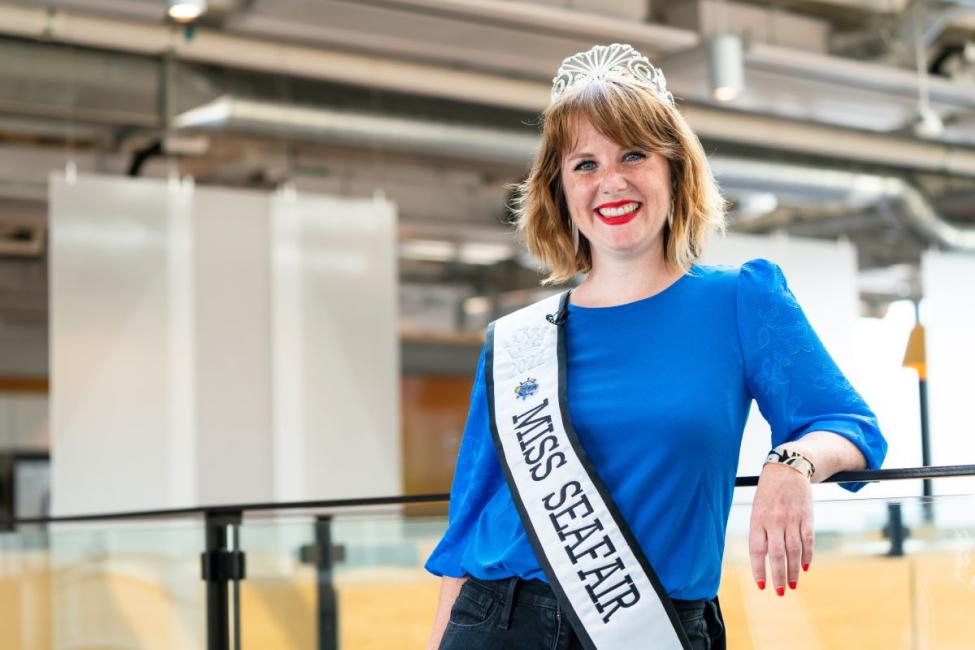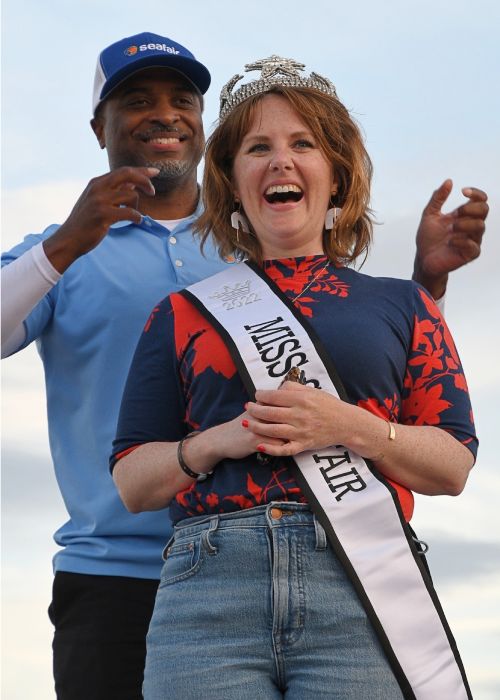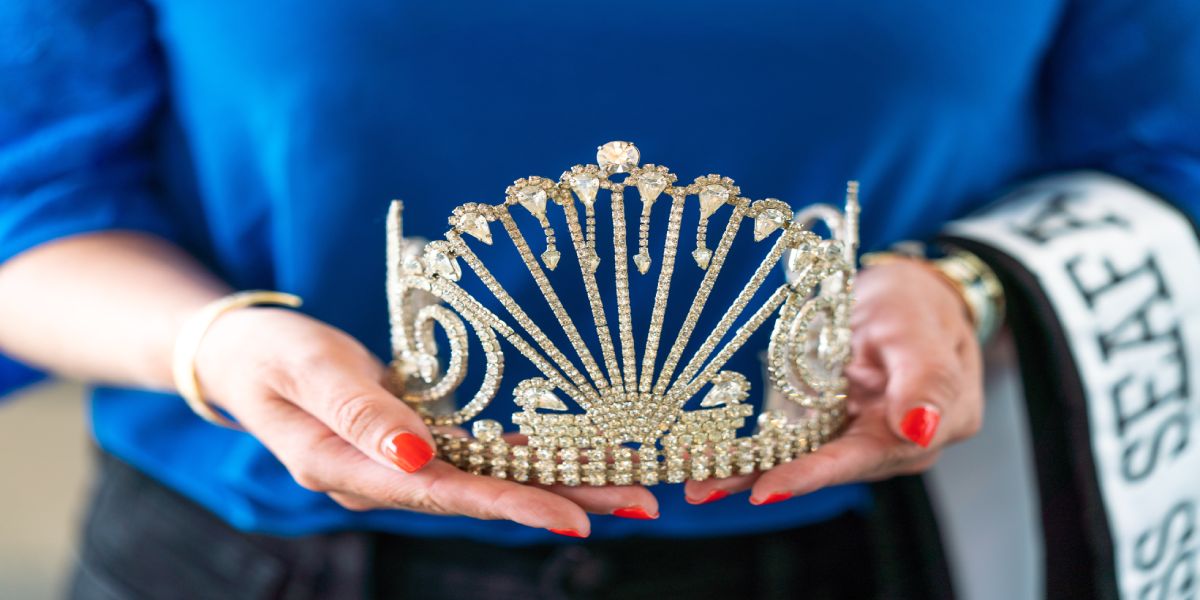Epidemiology doctoral student Anne Massey builds community trust in public health as 2022’s Miss Seafair

Anne Massey, Miss Seafair 2022 (Photo: Elizar Mercado)
Last summer, Anne Massey was sitting aboard a U.S. Navy ship in Seattle when the tiara a top her head started to break.
Massey was 2022’s Miss Seafair and was participating in a final Seafair reception after a week of media interviews, parades and meeting the Blue Angels. The tiara had been through a lot, in addition to having performed its sparkling duties for decades of Miss Seafair winners before.
Luckily, the Coast Guard Rear Admiral whisked the tiara with its sparkling diamonds and seahorses to the bottom of the ship, where members of the U.S. Navy soldered the metal pieces back together, making it stronger than it had been in years.
Massey is an epidemiology doctoral student at the University of Washington School of Public Health, where she researches disease outbreaks, firearm injuries and suicide prevention. She helped launch one of Washington state’s first COVID-19 testing sites in March 2020, and through her master’s thesis, helped improve our understanding of suicide risk and prevention in Washington state with better data collection.
So when she found out that she’d been named 2022’s Miss Seafair — a scholarship award given to college students who are then honored as royalty at the annual Seattle Seafair festival — she didn’t expect it to intersect with her epidemiology work. But in between riding in the Seafair Torchlight parade and wearing a sash and tiara, Massey had valuable conversations with community members which will inspire her public health work going forward.
“Being able to talk to people I never would have met otherwise, while I was out in this fun capacity, was very powerful,” Massey said. “We compared our takeaways from the pandemic and reflected on what those mean for our communities. I shared what I’ve been doing as a public health student and learned about other people’s stories. I will treasure those interactions for the rest of my life.”
Disease detective
Massey thinks her role as an epidemiologist was probably a factor in why she was selected for the Miss Seafair honor in 2022. Massey was nominated by a friend for Miss Seafair in February of 2020. While she was interviewing for the award in March of 2020, she was also on the frontlines of the COVID-19 pandemic, working at testing and case investigation sites.
“The very deep level of fear and concern that we all had during that time came up frequently through those discussions,” Massey said.
Like most other celebrations, the festival was cancelled in 2020 and again in 2021. In 2022, a Seafair representative reached out to Massey and asked if she was still a student and still interested in being Miss Seafair. They invited Massey to their annual Seafair Summer Fourth celebration at Gasworks Park, where they surprised her with a crowning ceremony. An attendee of Seattle’s Seafair celebrations since she was a child, Massey donned the tiara with pride.

After the COVID-19 pandemic, Massey doesn’t have to explain her work as an epidemiologist as much as she used to (fewer people these days ask if she’s a skin doctor). That’s because public awareness — and controversy — about the need to track and analyze the distribution of disease is much higher. But for people she met at the festival who didn’t know what an epidemiologist was, Massey described herself as a disease detective.
The idea of a disease detective motivates her in understanding and tracking diseases and injuries across populations. Every day as an epidemiology student is different. Some days she’ll prepare research presentations or meet with local area health agencies. Other days, she’ll teach fellow college students, analyze data for a project she’s working on, or be out doing field work.
But what’s most important to Massey as an epidemiologist is not forgetting the people behind the research she conducts. She was reminded of this lesson a few years ago, when she received a dataset she had been waiting for related to deaths in Washington state. That was also the day her grandfather died. She realized her grandfather would now be named in one row in that same death dataset going forward.
“That was a really powerful thing to realize,” Massey said. “In epidemiology, we think a lot about the columns and how the columns relate to each other. I think it’s important that we also realize that the rows are people, and the lived experience that goes with every single row is equally, if not more important, to reflect on. I think about that a lot when I’m doing my work.”
The greatest health crises of our time
Massey came to the University of Washington for graduate school in 2017 because she wanted to learn more about disease outbreak response and gun violence prevention. She had seen the film, “And the Band Played On” about the beginnings of the HIV/AIDS epidemic, which inspired her to be on the frontlines of the greatest public health crises of our time.
After joining the UW School of Public Health’s Department of Epidemiology, she worked with Professor Janet Baseman on the Student Epidemic Action Leaders (SEAL) Team, where she gained applied epidemiology experience through field assignments at the state and local health departments.
She also worked with Epidemiology Professor Ali Rowhani-Rahbar on firearm injury prevention, which led to one of the largest analyses ever conducted on lethal means assessment — or understanding someone’s access to items that could cause harm, such as medication or firearms. While studying lethal means assessment at one of the busiest urban medical centers in the Pacific Northwest, Massey and the research team found under-documentation of these assessments in the patient charts they were reviewing. This pattern turned out to be part of an emerging national trend in a variety of settings across the United States. Their research led to the clinic adopting new practices to collect this data, which is critical for suicide prevention on both the individual and population level.
Being able to work on research that had an immediate impact on her community motivated Massey to pursue her doctorate degree next and focus on another important health crisis of our time: suicide prevention.
At Seafair festival events, Massey had many interactions with members of the military, where her research on suicide prevention would often come up, and evolve into vulnerable discussions.
Through these conversations, Massey was reminded of the importance of relationships when it comes to understanding complex topics like suicide prevention. She was very moved by these discussions and continues to develop relationships, and in some cases friendships, with those she met in the US Coast Guard, US Navy, and Royal Canadian Navy during her time as Miss Seafair.
“The stories that people shared and the way that they opened up about the things I work on was really powerful, in ways that have actually made me start rethinking what I might want to do when I graduate,” Massey said.
While Massey doesn’t know exactly where her epidemiology career will take her, she says the tools she has learned as an epidemiologist will be useful for whatever new and emerging public health crises comes along. A child at the Seafair festival summarized it well, as they watched Massey drive by in her glittering seahorse tiara during the parade.
“You can be a scientist and a princess?!” the child asked.
“You can be anything you want to be,” a fellow onlooker said.
